|
De Amerikaanse dichter en schrijver Richard Blanco werd geboren op 15 februari 1968 in Madrid. Zie ook alle tags voor Richard Blanco op dit blog.
Uit: For All of Us, One Today
“Days before our field trip to the science center, Mrs. Bermudez tells our class the sun is actually hundreds of times larger than the earth. We move around it. We’re nothing, zooming through dark space, she says, matter-of-factly, as if it didn’t matter that we were no longer the center of our own little worlds. We, with crayons in our hands coloring dittos of the sun and our nine planets. We, at our desks but also helplessly zooming through cold, empty space. I don’t want to believe her; the sun is the size of a sunflower, I insist. I draw lemon-yellow petals around it and color its center sienna brown. The first time I see a lion I am nine years old, my grandfather’s hands holding me back from the cage I want to open. I can still feel his grip and the lion’s eyes staring at me like tiny, amber planets behind bars, asking me to set him free. My first kiss was under the shade of moonlit palms in Janet Carballo’s backyard, exactly two days before the end of the school year. But I’m still feeling the powdery skin behind her earlobes, smelling her strawberry lip gloss and the orange blossoms in the air already thick with summer. I never saw a comet until I was twenty-four, cupped in the darkness of the Everglades and the arms of a man I loved. It was past midnight on a Sunday, I remember; I didn’t go to work the next day. I’m still sleeping with the mangroves and the ibis, under a masterpiece of stars. The comet’s tail a brushstroke of pure, genius light.
These are more than memories. They are what lives—and relives—inside our bodies, in every cell and heartbeat. The undiscovered DNA of our souls imprinted with the minute details of those eternal moments that change our lives, our stories, forever. Sometimes they’re subtle, sometimes dramatic, but we know nothing will ever be the same the instant we experience them. And quite often they are unexpected.
On the afternoon of December 12, while casually driving back to my home in Maine, I receive a phone call with the news that I have been chosen as inaugural poet. Bewildered, I first wonder if it could be some cruel joke a friend might be playing on me. You mean like Robert Frost? Like Maya Angelou? I ask, wanting confirmation that what I just heard is true. Yes. Yes, I’m told, as I keep driving down the interstate in a daze, trying to speak, trying to fathom what has just happened. But I know. My body knows it’s the most important moment of my life as a poet, a day by which I will mark the rest of my life, the day I learned that I will be named the fifth poet ever in our history to be US Inaugural Poet.

Richard Blanco (Madrid, 15 februari 1968)
Hier bij de 2e inauguratie van president Obama in 2013
De Amerkiaanse dichteres en schrijfster Stacie Cassarino werd geboren op 15 februari 1975 in Hartford, Connecticut. Zie ook alle tags voor Stacie Cassarino op dit blog.
Early Snow
Some mornings are like this,
the stupor of longing or pure light,
stillness in a rifled grouse,
the black woods legible to a woman
whose heart is made of false starts,
the ruddy life of a hill gone blank
or what the face in the window
wants to believe of her past,
architecture of a white house,
this draft of rooms, paramour planets,
children with gentle hands, kindling
piled near the moon’s pillar, this draft
of despotic love, then distance, vacancy,
then forgiven words accumulating
like snow, just when the world
is finished with us, we build a wall
with rocks and the work is the whole
body inside the idea of belonging
somewhere, even if not for long,
mineral world of slate and flint,
numinous like these days and others
wintering, we test what will hold,
attenuated voices that lean
and fall, the argent sky, the worry
we don’t need anymore.
Goldfish Are Ordinary
At the pet store on Court Street,
I search for the perfect fish.
The black moor, the blue damsel,
cichlids and neons. Something
to distract your sadness, something
you don’t need to love you back.
Maybe a goldfish, the flaring tail,
orange, red-capped, pearled body,
the darting translucence? Goldfish
are ordinary, the boy selling fish
says to me. I turn back to the tank,
all of this grace and brilliance,
such simplicity the self could fail
to see. In three months I’ll leave
this city. Today, a chill in the air,
you’re reading Beckett fifty blocks
away, I’m looking at the orphaned
bodies of fish, undulant and gold fervor.
Do you want to see aggression?
the boy asks, holding a purple beta fish
to the light while dropping handfuls
of minnows into the bowl. He says,
I know you’re a girl and all
but sometimes it’s good to see.
Outside, in the rain, we love
with our hands tied,
while things tear away at us.
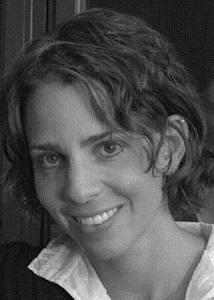
Stacie Cassarino (Hartford, 15 februari 1975)
De Duitse schrijfster, critica en presentatrice Elke Heidenreich werd geboren op 15 februari 1943 in Korbach. Elke Heidenreich viert vandaag haar 70e verjaardag. Zie ook alle tags voor Elke Heidenreich op dit blog.
Uit: Der Welt den Rücken
„Ich bin einmal, nur ein einziges Mal mit meiner Mutter zusammen verreist. Da war sie achtzig Jahre alt und noch sehr gerade, sehr energisch und tatkräftig, und ich war fünfundvierzig und hatte Rückenschmerzen, fühlte mich ziemlich alt und war alles andere als zufrieden mit meinem Leben.Meine Mutter lebte in einer ordentlichenWohnung in einer Kleinstadt im Süden und ich in einer unordentlichen in einerGroßstadt imNorden. Als sie älterwurde, besuchte ich sie öfter – notgedrungen, denn wir verstanden uns nicht besonders gut. Aber ich dachte, sie würde mich vielleicht brauchen, müßte doch in diesem Alter allmählich schwächer, schusseliger und vergeßlicher werden, und so reiste ich alle paar Monate an, um irgend etwas bei Behörden für sie zu erledigen, den Großeinkauf mit dem Auto bei Aldi zu machen, auf die Leiter zu steigen, dieGardinen abzunehmen und zu waschen, im Frühling den Balkon zu bepflanzen und im Herbst alles zurückzuschneiden und die Töpfe in den Keller zu tragen –wasman eben so macht als einzige Tochter, aus Pflichtgefühl, nicht unbedingt aus Liebe. Und immer kam es mir so vor, als wäre ich es, die schwächer, schusseliger und vergeßlicher würde und nicht sie. Sie sah mir zu, wie ich mit den Gardinen auf der Leiter stand, gab Anweisungen, rügte: »Du machst sie mit deinen Pfoten ja gleich wieder dreckig«, oder fand, daß ich die Azaleen ganz falsch zurückgeschnitten hätte. Sie bedankte sich auch nie, konnte es nicht einmal über sich bringen, »das hast du gut gemacht, Nina« zu sagen.
Das hatte sie nie gekonnt. Bei uns zu Hause wurde nicht gelobt. »Na also, es geht doch!« war das Höchste, was meiner Mutter an Anerkennung über die Lippen kam, und das war schon so gewesen, als ich noch ein Kind war und gute Noten aus der Schule nach Hause brachte – »Na also, es geht doch."
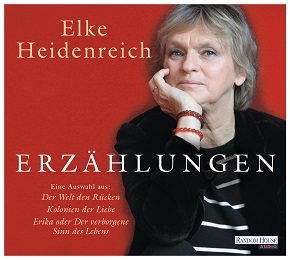
Elke Heidenreich (Korbach, 15 februari 1943)
Cover luisterboek
De Canadese schrijfster Chrystine Brouillet werd geboren op 15 februari 1958 in Loretteville, Quebec. Zie ook alle tags voor Chrystine Brouillet op dit blog.
Uit: À qui la faute?
“Québec, novembre 2015
Sa mère avait changé d'idée. Elle n'était pas d'accord pour qu'on lui offre un appareil qui valait aussi cher, mais maintenant que Mylène l'avait photographiée avec son Nikon, elle ne la jugeait plus trop jeune pour en avoir un. Elle s'était trouvée belle sur les photos. Pendant un instant, elle avait regardé sa fille autrement. Mylène avait dit qu'elle aimerait faire de la photo sous-marine. Cristelle avait aussitôt décidé que toute la famille partirait dans le Sud pour les vacances de Noèl. Ils pourraient tous en profiter pour s'améliorer au tennis. Elle-même s'y remettrait. « Penses-tu vraiment que je vais avoir le goût de jouer avec toi ? s'était dit Mylène. Si je veux descendre au fond de l'eau, c'est pour avoir la paix. Pour ne plus t'entendre. » Sur les photos, même celles prises avec son téléobjectif, il lui semblait que la voix de sa mère lui parvenait encore.
Croyait-elle que Mylène ne savait pas comment sa mère la regardait ? Qu'elle n'avait pas compris que Cristelle était rassurée de ne pas avoir engendré une beauté, une Blanche-Neige qui aurait pu devenir une rivale ? Pas de danger. Mylène ressemblait à son père. Elle avait seulement hérité des yeux et de la chevelure de Cristelle. Mais il faudrait que cette crinière noire cache davantage ses traits, qu'on ne voie pas son menton trop carré, sa bouche trop mince, son nez trop large. « Miroir, miroir, dis-moi qui est la plus belle. Mais c'est toi, Cristelle, la magnifique. Ne t'inquiète pas, maman, jamais je ne te ferai concurrence. En même temps, tu es déçue, non ? Tu aurais voulu un clone, une mini-Cristelle, une poupée à ton image qui t'aurait remplie d'orgueil. C'est raté. Tu dois l'avoir compris assez vite. Quand Lucas a eu trois ans. Il était si beau. C'était clair pour tout le monde. Ou quand tu as vu Jasmine. Première journée d'école. Jasmine à l'ossature d'une gazelle. Jasmine si gracieuse. Jasmine aux pommettes aussi hautes que les tiennes, bien dessinées. Pas des joues de bébé comme les miennes.”
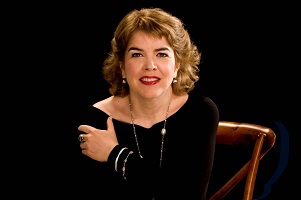
Chrystine Brouillet (Loretteville, 15 februari 1958)
De Duitse dichter en schrijver Hans Kruppa werd geboren op 15 februari 1952 in Marl. Zie ook alle tags voor Hans Kruppa op dit blog.
Uit: Das Geschenk der Sterne
„Als Tschuang Tse um die Mittagszeit von einem Spaziergang zurückkehrte, wartete ein junger Mann vor seinem Haus, verneigte sich höflich und fragte: "Bist du Tschuang Tse?"
"Ja, der bin ich."
"Mein Name ist Min Teng. Ich habe eine Nachricht für dich."
"Laß uns hineingehen", erwiderte Tschuang Tse.
Der junge Mann folgte ihm ins Innere seines kleinen Hauses, schloß die Tür hinter sich und sagte: "Es ist keine gute Nachricht. Du wirst jetzt sterben!"
Min Teng zückte seinen Dolch, doch etwas hinderte ihn daran, den todbringenden Stoß auszuführen. War es die Verblüffung darüber, daß Tschuang Tse nicht die geringste Furcht vor dem Sterben zeigte? Nicht eine Spur von Angst war in seinem Blick. Er sah Min Teng mit einer Gelassenheit an, die ihn maßlos verwirrte.
Je länger Min Teng in Tschuang Tses Augen sah, desto deutlicher wurde ihm bewußt, daß er ihn nicht töten konnte, ohne zuvor herauszufinden, warum er sich nicht vor dem Sterben fürchtete. Außerdem hatte ein Mann, der mit solchem Gleichmut der Zerstörung seines Lebens entgegensah, eine Aufklärung über den Grund seines Todes verdient. Min Teng senkte langsam den zum Dolchstoß erhobenen Arm.
"Wollen wir uns nicht setzen? Meine Beine sind etwas müde von meinem Spaziergang." Min Tengs Verwunderung über Tschuang Tses Sorglosigkeit wuchs. Hatte der Mann, den viele für einen bedeutenden Weisen hielten, seinen Verstand verloren?
Unwillkürlich streifte Min Tengs Blick über die karge Einrichtung des Raumes. Tschuang Tse lebte in Armut. Nur das Allernötigste war in dem kleinen Haus vorhanden und von den Spuren langen Gebrauchs gezeichnet. Seine abgetragene Kleidung hatte kleinere Löcher und Risse, seine Schuhe waren mit Schnüren zusammengebunden, damit sie nicht auseinanderfielen.
Die Tötung des schlanken, fast schmächtigen Mannes, der in Lumpen herumlief und sich gerade so unbekümmert auf einem der beiden zerschlissenen Sitzkissen niederließ, als hätte er die Lage der Dinge überhaupt nicht verstanden, würde ein Kinderspiel sein.“
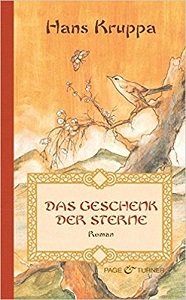
Hans Kruppa (Marl, 15 februari 1952)
Cover
De Amerikaanse wetenschapper en schrijver Douglas Richard Hofstadter werd geboren op 15 februari 1945 in New York. Zie ook alle tags voor Douglas Hofstadter op dit blog.
Uit: I Am a Strange Loop
“One gloomy day in early 1991, a couple of months after my father died, I was standing in the kitchen of my parents’ house, and my mother, looking at a sweet and touching photograph of my father taken perhaps fifteen years earlier, said to me, with a note of despair, “What meaning does that photograph have? None at all. It’s just a flat piece of paper with dark spots on it here and there. It’s useless.” The bleakness of my mother’s grief-drenched remark set my head spinning because I knew instinctively that I disagreed with her, but I did not quite know how to express to her the way I felt the photograph should be considered.
After a few minutes of emotional pondering — soul-searching, quite literally — I hit upon an analogy that I felt could convey to my mother my point of view, and which I hoped might lend her at least a tiny degree of consolation. What I said to her was along the following lines.
“In the living room we have a book of the Chopin études for piano. All of its pages are just pieces of paper with dark marks on them, just as two-dimensional and flat and foldable as the photograph of Dad — and yet, think of the powerful effect that they have had on people all over the world for 150 years now. Thanks to those black marks on those flat sheets of paper, untold thousands of people have collectively spent millions of hours moving their fingers over the keyboards of pianos in complicated patterns, producing sounds that give them indescribable pleasure and a sense of great meaning.”
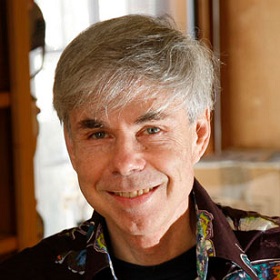
Douglas Hofstadter (New York, 15 februari 1945)
De Duitse dichter en schrijver Wilhelm Jensen werd geboren op 15 februari 1837 in Heiligenhafen (Holstein). Zie ook alle tags voor Wilhelm Jensen op dit blog.
Am ersten Sarge (Fragment)
Es war in schwüler Julizeit; die Gassen
im Städtchen draußen lagen stumm verlassen,
und schläfrig klang vom Turm das Glockenspiel
ins Schulgemach, wo schmal, wie goldener Duft,
ein Sonnenstreif ans Wandgetäfel fiel.
Die Fliegen summten müde durch die Luft,
und müde lag es auf den Knabenlidern,
die auf des alten Römers Weisheit tief
herniedernickten, nur ein Flüstern lief
verstohlen rund, ein Blick, ein kurz Erwidern,
und alles still und selbst der Lehrer schlief.
Die Blicke aber aller streiften scheu
den Platz zur Rechten mir, der leer heut war:
dort saß mein Nachbar sonst; wir hielten treu
zusammen stets in Not und in Gefahr,
wie Kinderspiel und Ernst es mit sich bringen.
Wir hatten's nie gesagt und kaum gedacht,
daß unsere Herzen aneinander hingen,
daß unsere Augen nacheinander gingen,
und wer's gesagt, wir hätten drob gelacht.
Und langsam von der Wand herniedersank
der Sonnenstreifen auf die leere Bank,
es war der Zeiger der erharrten Stunde;
wir ließen Cäsar mitten in der Schlacht,
der Lehrer schloß, fast eh' wir's noch gedacht,
das Buch, und blickte flüchtig in die Runde
und sagte: »Heinrich Wolf ist heute nacht
gestorben; wer ihn etwa sehn noch will,
der muß es heut, die Eltern lassen's sagen.«
Er ging; sonst drängte wohl in wildem Jagen
jedweder nach der Tür; heut blieb es still;
der Klang der letzten Worte nur lief schrill
noch an der Wand entlang, und wie im Traum
verklangen leise auf dem Flur die Schritte;
ich selbst gedankenlos in ihrer Mitte –
tot war er – tot – was war's? Sie wußten's kaum,
doch lag es seltsam auf den Kinderwangen,
wie Neugier halb und halb wie heimlich Bangen.
Nur mir war's so, als ob der warme Strahl
des Sonnenlichts mit kaltem Flor verhangen,
und drinnen fühlt' ich's, daß zum erstenmal
ein Schauer durch die warme Welt gegangen.
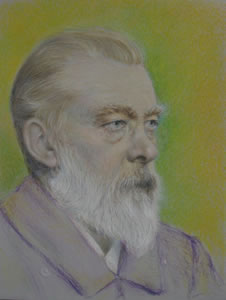
Wilhelm Jensen (15 februari 1837 – 24 november 1911)
Portret door Siri Pasina, 2012
De Griekse schrijver en zakenman Demetrius Vikelas, ook bekend als Bikelas werd geboren in Ermoupoli op 15 februari 1835. Zie ook alle tags voor Demetrius Vikelas op dit blog.
Uit: The Plain Sister (Vertaald door L.E. Opdycke)
“If I had spoken of men of taste, I should have had to confine myself to the dual number!” Mr. Plateas began to laugh at his own joke. His friend smiled too, but wishing a more exact answer, continued:
“At least we two have imitators; how many did you meet and who were they?”
“Always the same; Mr. A., Mr. B. ” And the professor began to count off on his fingers the peripatetic philosophers, as he used to call the frequenters of this promenade, that he had met, all of them old, or at least of ripe age, except one romantic youth who thought himself a poet.
“And no ladies?” asked the judge.
“Oh, yes, Mrs. X. with her flock of children, and the merchant, what is his name, Mr. Mitrophanis, with his two daughters.”
The judge had learned all he wanted to know without letting his friend perceive the drift of his questions. This was not very difficult, for the professor was by no means a modern Lynceus, and did not see any great distance beyond his nose. No doubt this resulted from the innate simplicity and integrity of his character; having never been able to conceal or feign anything himself, he was easily led to believe whatever he was told. The readiness with which he became the victim of his friends each first of April was notorious. He was always on the watch from the night before; but his precautions were in vain. He was a man of first impressions. Sometimes, but not often, he fathomed the questions afterward, and discovered that he had not acted or spoken as he would have liked. As a rule, however, these after-thoughts came too late to be of any use, and he had to console himself with the reflection that what’s done is done.
“What do you say, will you stroll on with me?” asked the judge.
“What, at this hour, my dear friend!”
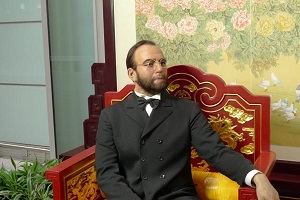
Demetrius Vikelas (15 februari 1835 – 20 juli 1908)
Als wassenbeeld in het Olympisch stadion van Beijing
Onafhankelijk van geboortedata:
De Duitse dichter en schrijver Tobias Amslinger werd geboren in 1985 in Stuttgart. Zie ook alle tags voor Tobias Amslinger op dit blog.
Landschaft
Zeichnen Sie einen ersten Landstrich.
Formen Sie jetzt einen Landkreis daraus.
Sehen Sie zu, wie landab, landauf,
entlang der Linie ein Landauer fährt.
Nehmen Sie als Landbesetzer darin Platz.
Schlagen Sie in Ruhe ihr Landei auf.
Fühlen Sie sich ganz als Landbesitzer, der
landein, landaus, von Landtag zu Landtag,
das Landbrot bricht. Lauschen Sie:
was die Geige des Landstreichers spricht.
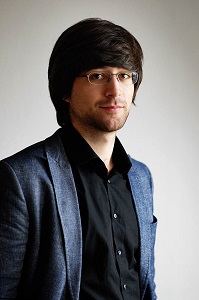
Tobias Amslinger (Stuttgart, 1985)
Zie voor nog meer schrijvers van de 15e februari ook mijn blog van 15 februari 2015 deel 1en eveneens deel 2.
Zie voor bovenstaande schrijvers ook mijn blog van 15 februari 2007 en ook mijn blog van 15 februari 2008 en eveneens mijn blog van 15 februari 2009.
15-02-2018 om 00:00
geschreven door Romenu 
Tags:Richard Blanco, Stacie Cassarino, Elke Heidenreich, Chrystine Brouillet, Hans Kruppa, Douglas Hofstadter, Wilhelm Jensen, Demetrius Vikelas, Tobias Amslinger, Romenu
|

